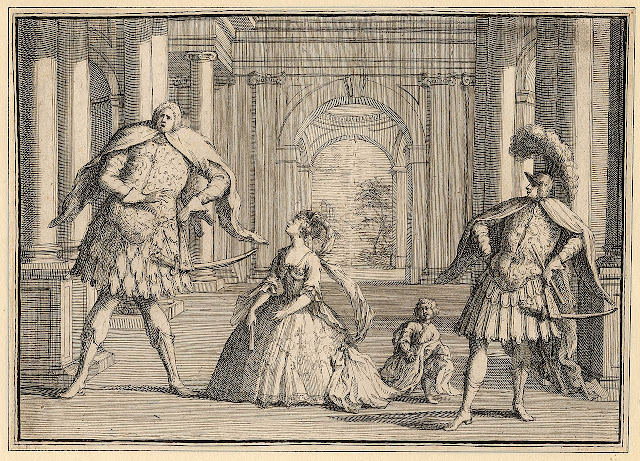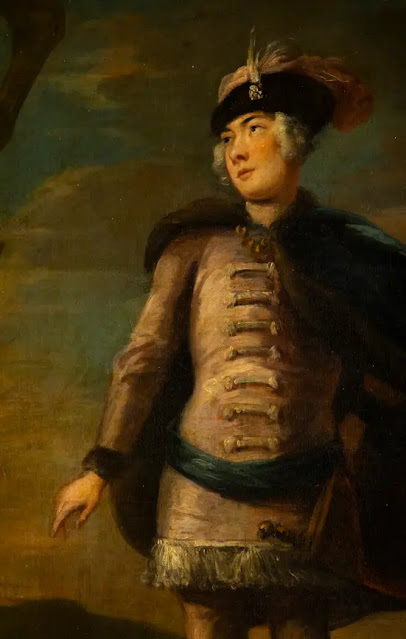 |
| A caricature of a performance of Handel’s Flavio (from 1723) featuring Senesino and Francesca Cuzzoni with Berenstadt (far right) |
Handel’s opera Rodelinda was premiered 300 years ago this year, on 13 February 1725 at the King’s Theatre in the Haymarket (the original King’s Theatre burned down in 1789 and His Majesty’s Theatre is currently on the site). Celebrations to mark the anniversary include an exhibition at the Handel Hendrix House which features a rarely seen portrait of castrato Senesino in the role of Bertarido from Rodelinda by John Vandenbank (see my article) and Garsington Opera’s new production of the opera, directed by Ruth Knight with Lucy Crowe as Rodelinda, Tim Mead as Bertarido and Peter Whelan conducting the English Concert.
 |
| Senesino by John Vandenbank. Private Collection, UK. © The Handel House Trust/Christopher Ison. |
Rodelinda was successful during Handel’s lifetime, with 14 performances that season and the opera was revived the following season and in 1731. It was also presented under Telemann’s auspices at the Oper am Gänsemarkt in Hamburg. The revival of the opera in 1920 in Göttingen by Handel enthusiast Oskar Hagen represented an important step in the modern revival of Handel’s operas.
Handel had a strong team of singers for the 1724/1725 season of the Royal Academy of Music and his operas for the company that season represent him at his peak, Tamerlano which premiered on 31 October 1724, then Rodelinda (with the same cast) on 13 February 1725. And just to show that he was on a roll, he had already premiered Giulio Cesare in February 1724.
His cast featured castrato Senesino as Bertarido. Senesino first sang for Handel in 1720, in a revival of Radamisto and he would go on to create 17 leading roles for the composer. Rodelinda was sung by soprano Francesca Cuzzoni, who first sang Teofane in Ottone for Handel in 1723, going on to create nine roles for Handel. Horace Walpole famously described her thus, in Rodelinda:
“She was short and squat, with a doughy cross face, but fine complexion; was not a good actress; dressed ill; and was silly and fantastical. And yet on her appearing in this opera, in a brown silk gown trimmed with silver, with the vulgarity and indecorum of which all the old ladies were much scandalised, the young adopted it as a fashion, so universally, that it seemed a national uniform for youth and beauty.”
What gives Rodelinda (and Tamerlano) their distinctive cast in the Handel opera canon is that during the 1724/25 season, Handel’s team also included the distinguished tenor Francesco Borosini. Not only did Borosini create the roles of Bajazet in Tamerlano and Grimoaldo in Rodelinda, but Handel rewrote the soprano castrato role of Sesto in Giulio Cesare for him, creating significant amounts of new material.
The libretto for Rodelinda is by Nicola Haym, a London-based Italian who was a composer, cellist (one of Handel’s continuo cellists), poet and general man of all work. Rodelinda is one of around eight librettos that Haym adapted for Handel. It was based on an earlier one, originally set by Giacomo Antonio Perti in 1710 which in turn was based on Pierre Corneille’s tragedy Pertharite, roi des Lombards (1652), with Pertharite becoming Bertarido. As was usual for London, Haym’s libretto cuts significant amounts of recitative and concentrates on the two leading characters, Rodelinda and Bertarido.
The combination of the theme of marital love and fidelity with a strong libretto and Handel at his peak have ensured that the opera has been frequently revived, and it is thought that the marital fidelity theme was instrumental in persuading Hagen to revive the opera in 1920.
Garsington Opera’s production of Handel’s Rodelinda opens on 13 June 2025. Directed by Ruth Knight and designed by Leslie Travers, the cast includes Lucy Crowe as Rodelinda, Tim Mead as Bertarido, Ed Lyon as Grimoaldo, Marvic Monreal as Eduige, Hugh Cutting as Unulfo and Brandon Cedel as Garibaldo. Peter Whelan conducts the English Concert.
Further information from the Garsington Opera website.










